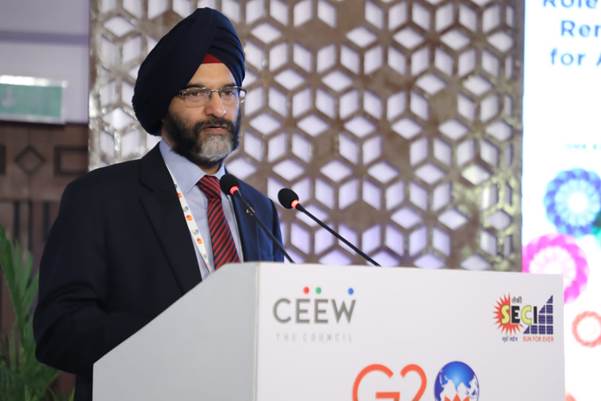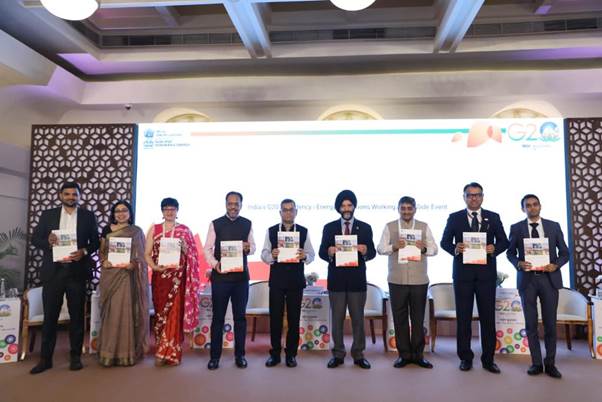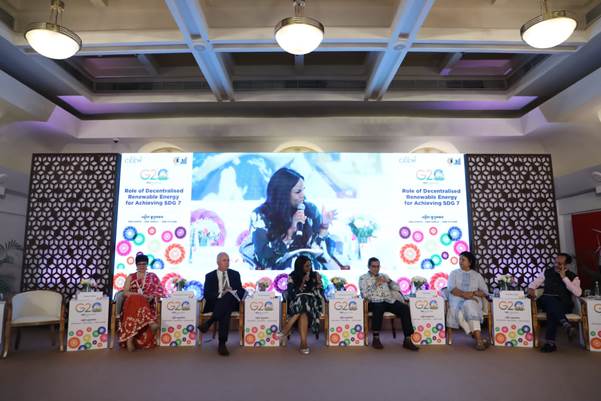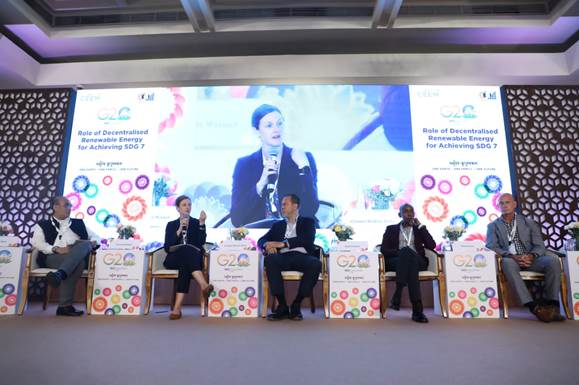Ministry of New and Renewable Energy
Distributed Renewable Energy can help achieve SDG 7 – access to affordable & sustainable energy for all: G20 Energy Transitions Working Group Side-event
Decentralised Renewable Energy must be at the centre of just and inclusive global energy transitions: Secretary, New & Renewable Energy
Posted On:
20 JUL 2023 7:11PM by PIB Delhi
Goa, 20th July, 2023
What is the role of Decentralized Renewable Energy (DRE) for achieving Sustainable Development Goal 7, that of ensuring access to affordable, reliable, sustainable and modern energy for all? This is the question explored at a side-event held in Goa today, as part of the fourth and final Energy Transitions Working Group meeting under India’s G20 Presidency.
Addressing the inaugural session of the side-event, Shri Bhupinder Singh Bhalla, Secretary, Ministry of New and Renewable Energy (MNRE), Government of India said: “Universal energy access has been the core facet of the global energy transition and the G20 is highlighting it. For this, Decentralised Renewable Energy (DRE) must be at the centre of just and inclusive global energy transitions. But no one can act alone and countries need to cooperate here. With strong growth in renewable energy and faster adoption of DRE applications, India is at the forefront of the clean energy transition.”
The side-event, hosted by the Ministry of New & Renewable Energy, with support from the Council on Energy, Environment and Water (CEEW) and the Solar Energy Corporation of India Limited (SECI), focussed on the role of Decentralized Renewable Energy (DRE) in bridging the energy access gap — both as an alternative and as complementary to centralised grid systems. “We need long-term solutions to the world’s energy needs. DRE can help provide energy access to not just households but also agriculture and micro businesses. To progress further, global cooperation in the form of cross-learning and exchange of best practices can be a powerful and transformative way of achieving success,” Shri Bhalla added.

Shri Bhupinder Singh Bhalla, Secretary, MNRE, delivering the inaugural address at the Energy Transitions Working Group meeting side event, ‘Role of Decentralised Renewable Energy for Achieving SDG 7’, on 20 July 2023 in Goa.
“We have to see the lack of energy access as an emergency, but we don’t”
The event also saw the participation of Ms. Damilola Ogunbiyi, CEO and Special Representative of the UN Secretary-General for Sustainable Energy for All and Co-Chair of UN-Energy, in a panel where she stressed the importance of investments in DRE technologies. “Globally, we have to see the lack of energy access as an emergency, but we don’t. People see DRE as a few RE-powered lightbulbs, instead of how it can increase production and economic growth, and reduce our reliance on fossil fuels. We have the technologies and capacity we need, what we don't have is the right amount of financing to scale these business models,” she said.
“In 2021, 179 million people got energy access through DRE Solutions”
In his address, Shri Dinesh D. Jagdale, Joint Secretary, Ministry of New & Renewable Energy, said, “DRE is a key solution to meeting the rising energy needs. Their decentralised nature allows them to tap into locally available renewable energy resources and they can be customised to meet diverse energy needs for residential, institutional and productive uses. In 2021, 179 million people gained access to electricity from DRE solutions — up from 35 million in 2012.” He also highlighted the Indian G20 Presidency’s efforts to enable a supporting ecosystem for the scale-up of DRE integration.
Report on DRE Good Practices for SDG7 Released
The event, which convened leading sectoral experts from international agencies, industry, finance, academia and policy-making, saw the launch of a report titled ‘Compendium of DRE Good Practices for SDG7’ by Council on Energy, Environment and Water (CEEW). The compendium, launched by CEEW’s CEO Dr. Arunabha Ghosh, and Mr Abhishek Jain, Fellow and Director - Powering Livelihoods with others, looked at 120+ DRE cases from across the globe to create a guide for public and private sector leaders to mainstream DRE for SDGs. It recommends focusing on policies with a long-term vision to provide market certainty, engaging communities actively, ensuring accessible and affordable financing, and including cross-country partnerships. Check out the compendium here.

Report launch of CEEW's report ‘Compendium of DRE Good Practices for SDG7’ at the official side event, ‘Role of Decentralised Renewable Energy for Achieving SDG 7’, under India’s G20 Presidency, on 20 July 2023 in Goa.
Delivering opening remarks, Shri R. P. Gupta, Chairman & Managing Director, SECI said: “SDG 7 mandates energy access to all. But it has to be affordable first to be accessible. DRE is useful for areas that are otherwise inaccessible to the grid or have a dispersed population, but the main challenge is its cost. Here, experiences of other countries will help us arrive at a solution.”
Shri Puneet Kumar Goel, Chief Secretary, Government of Goa, said: “The cost of grid-connected solar energy has been coming down since the early 2000s. But we need a revolution in battery storage as well to reduce the cost of off-grid solar energy. We need policies so that power distribution companies (discoms) encourage feed-in-tariffs to motivate individual consumers to shift to rooftop solar.”
The event also featured two panel discussions, one moderated by Dr. Arunabha Ghosh and another by Mr. Abhishek Jain, on accelerating DRE for impacting sustainable development goals at scale and on ensuring inclusive energy access through collaboration.

Panel 1: Accelerating DRE for impacting sustainable development goals at scale. (L-R: Suman Chandra, Tomas Anker Christensen, Damilola Ogunbiyi Yudo Dwinanda Priaadi, Gauri Singh, and Arunabha Ghosh)

Panel 2: Ensuring inclusive energy access through collaboration (L-R: Chandra Shekhar Sinha, Amanda Maxwell, Sophie Odupoy, and William Brent)
Other luminaries speaking at the event included Tomas Anker Christensen, Climate Ambassador, Ministry of Foreign Affairs and the Ministry of Climate, Energy and Utilities, Denmark; Yudo Dwinanda Priaadi, Senior Advisor for Strategic Planning, Ministry of Energy and Mineral Resources, Republic of Indonesia; Gauri Singh, Deputy Director-General, International Renewable Energy Agency; Suman Chandra, Deputy Secretary, MNRE; Chandra Shekhar Sinha, Global Lead for Carbon Markets and Finance, World Bank; Amanda Maxwell, Managing Director, International Program, NRDC; Sophie Odupoy, Group Head Of Public Affairs, KOKO Networks; and William Brent, Chief Marketing Officer, Husk Power Systems.
The event fostered stimulating discussions on fast-tracking DRE deployment to achieve SDG 7. The event also saw the participation of many users of DRE technologies in India, such as Kuni Dehuri, a user of a solar silk-reeling machine, Jalindar Machindra Rout, a user of biomass-based cold storage, and Toshima Dahariya, a staff nurse at Chhattisgarh’s solarised primary health centre. The event also featured Suraj Ka Gola, India’s solar anthem.
A just and inclusive global energy transition is incomplete without universal energy access. At the current pace of progress, IEA estimates that 660 million people in the Global South will still lack electricity access by 2030 — the year to achieve Sustainable Development Goals (IEA, 2022). DRE technologies leverage locally-available renewable energy resources to meet diverse energy needs for residential, institutional and productive uses.
The closing address was delivered by Mr. Anant Kumar, Director, MNRE.
The conference video is available here.
***
PIB DELHI / GOA | AM / GSK / DJM
(Release ID: 1941194)
Visitor Counter : 2793